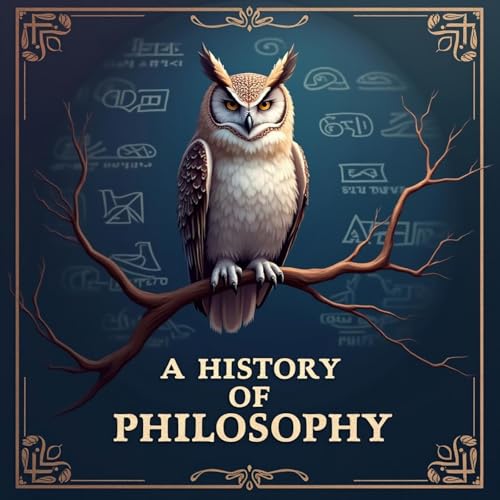
A History of Philosophy
No se pudo agregar al carrito
Add to Cart failed.
Error al Agregar a Lista de Deseos.
Error al eliminar de la lista de deseos.
Error al añadir a tu biblioteca
Error al seguir el podcast
Error al dejar de seguir el podcast
Compra ahora por $4.00
-
Narrado por:
-
Virtual Voice
-
De:
-
Bob Kowalski

Este título utiliza narración de voz virtual
"A History of Philosophy" offers a panoramic and didactic view of the development of philosophical thought from its origins to the present. The book stands out for its clarity and accessibility in presenting complex ideas, making it an excellent introduction for students and readers interested in the evolution of major philosophical currents.
The work begins by reflecting on what philosophy is, highlighting the difference between philosophy, religion, and science, and its importance as a tool for understanding human reality. This introduction prepares the reader for the journey that follows, addressing philosophers from the Pre-Socratics to contemporary issues.
The first section of the book is dedicated to Ancient Philosophy, presenting philosophers such as Thales, Anaximander, and Heraclitus, whose reflections on nature and change laid the foundations for Western philosophical thought. The transition to Socrates, Plato, and Aristotle is well detailed, focusing on their search for virtue and knowledge.
In the chapter on Medieval Philosophy, the work explores how Christian philosophy interacted with classical thought, highlighting figures such as St. Augustine and St. Thomas Aquinas. It also provides an overview of Islamic and Jewish philosophy, with figures like Avicenna, Averroes, and Maimonides, who preserved and developed philosophical knowledge.
Modern Philosophy marks the transition to an empirical and rationalist approach, with thinkers such as Descartes, Spinoza, Locke, and Hume. The Enlightenment and Rousseau's social contract are analyzed, as well as the Kantian revolution, which changed the way knowledge and ethics were understood. Schopenhauer is highlighted for his pessimism, as a response to Kant's idealism.
The contemporary section focuses on the emphasis of Marx's ideas and his critique of capitalism. Another chapter highlights utopian socialists such as Saint-Simon, Fourier, and Owen, as well as anarchists Bakunin and Proudhon, offering a critical view of alternatives to the capitalist system.
Nietzsche is addressed as central to the critique of traditional morality, with his concept of nihilism and the "death of God." The book also explores the existentialist philosophy of Kierkegaard and Heidegger, American pragmatism, and postmodernism, with Foucault and Derrida challenging reason and dominant narratives.
Finally, "A History of Philosophy" addresses contemporary issues such as applied ethics and artificial intelligence, as well as the integration of Eastern and Western philosophies, reflecting on the future of philosophy in a globalized and technological world.
This book is essential reading for those who wish to understand Western philosophy and its main currents. It strikes a balance between depth and clarity, making philosophical thought accessible while maintaining the complexity of the issues discussed. With a keen eye on historical connections and contemporary issues, "A History of Philosophy" is a valuable guide for understanding the legacy of the ideas that shaped the world.
Las personas que vieron esto también vieron:


















AI slop
Se ha producido un error. Vuelve a intentarlo dentro de unos minutos.


